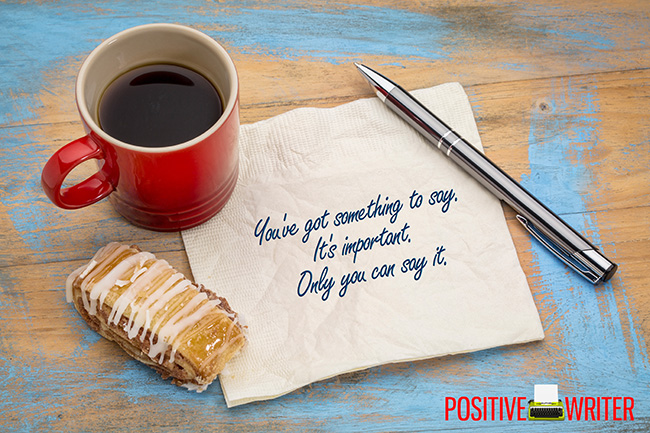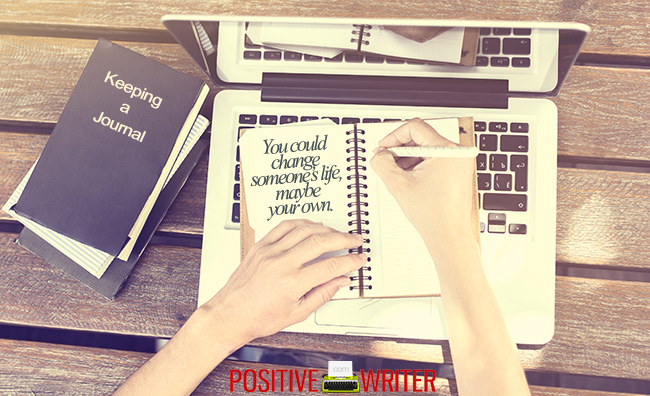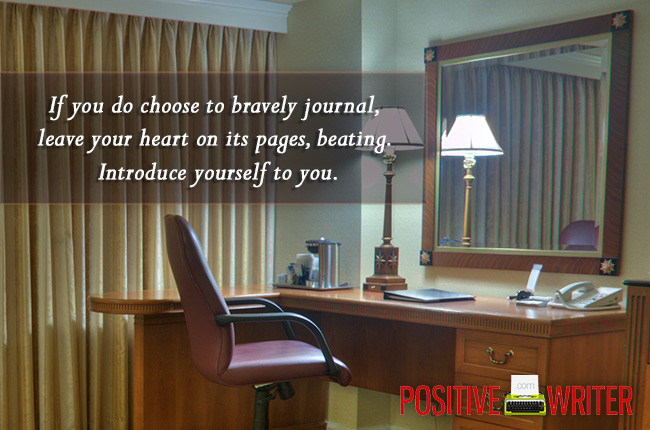Why do you hurt? Why do you laugh? Why do you cry? What makes you jump for joy? What makes you want to fly?

You’ve got something to say. It’s important. Only you can say it.
We all have a story. What’s yours?
Consider journaling, it could change your life. And maybe, if you want to share your life’s treasures, it could change the life of others.
We can all learn from each other, but even more wondrous is that when we journal daily we can astonish ourselves by learning we may already have the answers we need.
But don’t just take my word for it.
8 quotes to inspire you to keep a journal:
A personal journal is an ideal environment in which to “become”. It is a perfect place for you to think, feel, discover, expand, remember, and dream.
―Brad Wilcox
When it was suggested that I journal my life’s story so that I could learn from it and truly “see” what I have experienced, learned and who I have become, I scoffed. How absurd.
But I could not get the idea out of my mind, so I started writing in a loose leaf journal and once I began I could not stop. I became addicted to it.
I learned so much. I learned the reality of my childhood and why I behaved the way I behaved. Thanks to journaling I came realize how resourceful I had been.
I had always doubted myself so much and refused any credit for achieving anything. Journaling changed that and helped remove the cloud of doubt that had circled around me for so long.
I eventually published my life’s journal as a memoir and it went on to help thousands of people who were dealing with similar issues.
![]() As I read Bryan’s memoir, I wept. I wept for Bryan, for me, for my clients, for my relatives, for my friends. Bryan does an incredible job of pulling the reader into his real world. I have a copy of this book in my waiting room. Often my clients come in for their session holding the book, saying, ‘This is awesome!’ or ‘OMG, this book is about me.'” ―Sharon St. John, LPC
As I read Bryan’s memoir, I wept. I wept for Bryan, for me, for my clients, for my relatives, for my friends. Bryan does an incredible job of pulling the reader into his real world. I have a copy of this book in my waiting room. Often my clients come in for their session holding the book, saying, ‘This is awesome!’ or ‘OMG, this book is about me.'” ―Sharon St. John, LPC
That’s the power of journaling.
You could change someone’s life, maybe your own.

Primary children are taught that journal writing reinforces the idea that each person is important. His or her experiences and feelings are valuable and are worth recording so they are not lost.
―Valiant B, Primary Manual
Children become adults and adults become children again. Your feelings, your beliefs, your lessons learned are valuable, they’re important and they’re essential to the continuance of civilization.
Never downplay the significance of your experiences.
We need your story.
Too often we, as humans, fail to give ourselves the credit we deserve, for what we have learned, what we have endured, and yes, for what we have overcome.
We fail to give ourselves credit for others we have helped and others we have changed, simply by being who we are. Being humble is honorable; however, being unaware of our abilities and influence is helpful to no one.
Never… never… never sell yourself short.
If you’re serious about becoming a wealthy, powerful, sophisticated, healthy, influential, cultured, and unique individual, keep a journal. Don’t trust your memory. When you listen to something valuable, write it down. When you come across something important, write it down.
―Jim Rohn
How could someone plagued by doubt all of his life write a book about writing? Not just any book, but a book that’s actually helping writers become the writers they were meant to be?
Answer: Journaling.
![]() All writers doubt their ability. But Bryan’s story shows doubt and fear don’t have to define your writing future. In this part-memoir, part kick-in-the-pants, Bryan will show you how to live out your passion, write a book, and become an author, no matter if the so-called ‘experts’ tell you that you can’t.” ―Joe Bunting on Writer’s Doubt.
All writers doubt their ability. But Bryan’s story shows doubt and fear don’t have to define your writing future. In this part-memoir, part kick-in-the-pants, Bryan will show you how to live out your passion, write a book, and become an author, no matter if the so-called ‘experts’ tell you that you can’t.” ―Joe Bunting on Writer’s Doubt.
Your story could help others overcome their struggles, too. You don’t have to have the answers, simply journaling the problem could provide the solutions. Often the solutions we are looking for are already there within the words of the story.
Write the story.
Journaling is like whispering to one’s self and listening at the same time.
―Mina Murray, Dracula
One of the most important lessons journaling taught me is that we cannot rely on our thoughts alone.
Thoughts come and go in our heads, connecting and disconnecting. Often they’re so jumbled up, mixing, matching and mismatching, that we become filled with suffocating doubts for no reason other than our thoughts can be bewildering when left unreconciled.
Writing our thoughts on paper gives us clarity. Once written we can see the reality, what we’re truly thinking and we can then adjust our thoughts and even correct them.
It’s important to journal for clearness of thinking. Never trust thoughts that come and go and come again, because our emotions and our thoughts about our thoughts are constantly changing, feeding us ever more doubts.
I haven’t written for a few days, because I wanted first of all to think about my diary. It’s an odd idea for someone like me to keep a diary; not only because I have never done so before, but because it seems to me that neither I—nor for that matter anyone else—will be interested in the unbosomings of a thirteen-year-old schoolgirl. Still, what does that matter? I want to write, but more than that, I want to bring out all kinds of things that lie buried deep in my heart.
―Anne Frank
Were it not for Anne’s personal journal, an accounting of her day to day life in hiding, her story would’ve never been discovered. Journal your daily life and perhaps one day your story may be found and reveal the story of a generation.
Never underestimate your journal.
Preserve your memories, keep them well, what you forget you can never retell.
―Louisa May Alcott
Do you remember the great idea that you forgot?
No, not that one. The one you forgot.
There are so many, aren’t there? Journal daily and you may never forget another idea ― who knows, one of those ideas could spectacularly change the world.
If you want to write, you need to keep an honest, unpublishable journal that nobody reads, nobody but you. Where you just put down what you think about life, what you think about things, what you think is fair and what you think is unfair.
—Madeleine L’Engle
Aspiring writers often ask me the million dollar question, “How do I find my voice?” and invariably I answer: Keep a journal just for you.
Few of us are brave enough to write the way we think when we know others are going to read it. Private journal writing is the best practice for writing in your true voice. In your true voice, you’ll say “F**k it!” when you mean to say it and not “Oh shucks!” because you think someone’s going to be offended.
However, your voice goes beyond the censoring of a 4 letter word, as that is merely a symptom of a bigger problem.
When we manage our initial writing in a way that is considered “okay” for others to read (it’s never okay, there will always be someone who will dislike what you say or how you say it), we tend to inhibit our voice and it affects our overall writing.
That is precisely why it is much better to write in private first, the way you mean to write, to say what you mean to say in the way you mean to say it.
If you choose to publish later, feel free to edit your work. Editing won’t undermine your voice. Contrary, it will make it ring clearer than ever.
The more we practice writing behind the curtain, the more adept we become at writing in our voice, uninhibited and true.
Eventually, you will come to a point when you feel comfortable in your own skin, or rather, in your own voice in this case.
Indeed, private journaling is powerful and yet too many dismiss it or couldn’t be bothered with it.
To each their own. What about you?

If you do not breathe through writing, if you do not cry out in writing, or sing in writing, then don’t write, because our culture has no use for it.
—Anaïs Nin
By writing daily in your journal, you will find the beauty of who you really are and why you’re here.
Journaling is not only about reflection, although important. No, Journaling is about connecting with yourself, the child within, the teen, the adult, the parent, the grandparent, the omnipresent being that you are and always have been.
Within your mind is a universe and it is never ending, it has no borders, it has no beginning as it has no ending.
You could write forever and never say all that you could say, but you will write what matters when it matters and that is the true wonder of journaling.
If you do choose to bravely journal, leave your heart on its pages, beating.
Introduce yourself to you.
